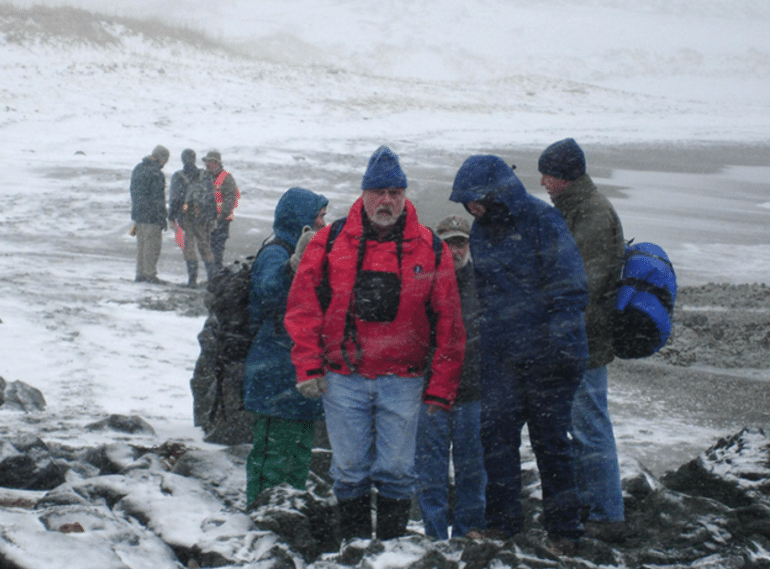
As an academic scientist and a world-renowned first responder to oil spills, Ed Owens has had a more varied life than most – and certainly one with more than its fair share of excitement.
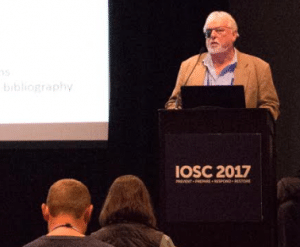 He has worked on some of the world’s biggest and most infamous spills, such as Exxon Valdez in Alaska in 1989 and the Deepwater Horizon BP disaster in the Gulf of Mexico in 2010.
He has worked on some of the world’s biggest and most infamous spills, such as Exxon Valdez in Alaska in 1989 and the Deepwater Horizon BP disaster in the Gulf of Mexico in 2010.
At a rough count, Ed (OE 1956–1964) has travelled to more than 70 countries over his long career, including frequent visits to some of the planet’s most remote locations. He has survived involvement in “a couple of aircraft crashes”, being chased by the Argentine army, and being kidnapped in the Amazon; he has run training for coastguards all over the world, and he has trained sniffer dogs to detect oil leaks underground.
In the years immediately following the fall of the Soviet Union, Ed made five or six visits annually to work on the development of oil fields on Sakhalin Island in the Russian Far East. “I have many stories about those trips!”
There was also the time he found himself stuck on an Arctic island without a radio: just one episode in his many visits north of the Arctic Circle, where he had been every year for more than three decades until 2020, when Covid put an end to this remarkable run.
Yet, in speaking to Alumni News, Ed said he prefers to reflect not so much on his own remarkable exploits, but on his origins, on his memories of QE in the 1950s and early 1960s – including what made it a good School even back in those culturally very different days – and on passing on some hard-won advice to the young Elizabethans of today.
“I’m 76 years old, still working full-time, still publishing multiple technical papers each year in scientific peer-reviewed journals, and still loving every day of my family and professional life. A full and productive life.
“How did I get here? My paternal grandfather was a shepherd in Rutland who spent most of his life living outdoors tending the animals year-round. Just coming home on Saturday night to have a beer in the pub, bath on Sunday morning, then church and Sunday lunch with the family and then back to the fields. My maternal grandfather was a ‘horseman’, which in those days meant that he looked after all the horses on the farm. He had Christmas Day off, when the farmer would start the morning routine.
“Out of all the many cousins – I think 15, to be exact – I was the only one that went to grammar school, then I was the only one to go to university until another cousin some 10 years later who, like me, went on to do a PhD.
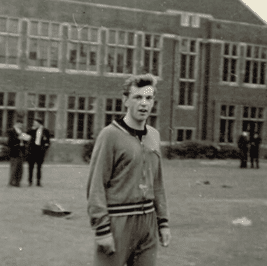 “Luck? Good fortune? No, not really. As many people have said I wasn’t lucky, but I worked hard – and I also would have to add that many people worked very hard on my behalf: my parents and the teachers at QE, especially my House Master, John (‘Poker’) Pearce, and subsequently a couple of mentors who shaped my professional career.
“Luck? Good fortune? No, not really. As many people have said I wasn’t lucky, but I worked hard – and I also would have to add that many people worked very hard on my behalf: my parents and the teachers at QE, especially my House Master, John (‘Poker’) Pearce, and subsequently a couple of mentors who shaped my professional career.
“Needless to say, the School was very different in my day. While the buildings and grounds still appear familiar, there was a great focus on sport, with Wednesday and Saturday afternoons devoted to the range of seasonal choices, and with classes on Saturday mornings to make up for the ‘lost’ Wednesday afternoons! That did not leave much time for other things, though several of us made up a soccer team that played on Sunday at the Underhill Playing Fields.
“Those days, almost everybody lived in the Barnets or the Borehamwood-Elstree-Brookmans Park area: basically within a ½ hour bus ride of the school. It was a predominantly white Christian population, probably less than 5% non-Christian or otherwise ethnically diverse. And, like today, no girls of course!
“Did that prepare us well for the big wide world? On reflection, in my own very personal situation, for some reason I have been quite oblivious to the ethnicity or the sexual preference of people with whom I interact. Quite often when a third-party says something about that topic, my reaction is ‘oh, I didn’t notice that’. I certainly did not get that from my parents. who were very Victorian and “straight”, so it must have come from the School and the tolerant and intelligent teachers that we were fortunate to have.
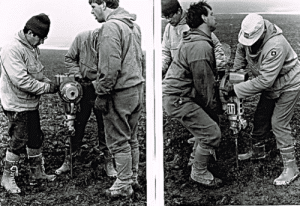 “Most of the group at that time were Arsenal supporters because that was the nearest football ground from Barnet by British Rail. I don’t understand why, but a couple of our contemporaries actually supported Chelsea or, even worse, Tottenham! Sadly, Charlie Eggington, the Underne House Captain who followed me, is a Spurs supporter – clearly I failed in that part of mentoring him.
“Most of the group at that time were Arsenal supporters because that was the nearest football ground from Barnet by British Rail. I don’t understand why, but a couple of our contemporaries actually supported Chelsea or, even worse, Tottenham! Sadly, Charlie Eggington, the Underne House Captain who followed me, is a Spurs supporter – clearly I failed in that part of mentoring him.
“The point is we still support those teams today when we have our Zoom conference calls. It’s not about football, it’s not about the team; it’s about just following and believing in those things that have some value. The great thing about sports is that the results are totally unpredictable. That gives enjoyment to following whatever sport, whatever team, whatever person one might be interested in following.”
Ed stayed on into the Seventh Form and was a Prefect and the House Captain for Underne. On leaving QE, he took his first degree, in Geology/Earth Science at the University College of Wales, Aberystwyth – “three amazing years of playing rugby, rock climbing and mountaineering”.
After that, he wanted to take a postgraduate degree – “go to grad school” in American parlance – but there were limited opportunities at that time in the UK, a country which, as Ed points out, was still recovering economically from the Second World War and had yet to develop North Sea Oil. So, in 1967, he went to Canada on a graduate student fellowship to take his Master’s in Physical Geography at McMaster University in Hamilton, Ontario. His new life got off to an exciting start: “On Day 7 in North America, I was on a four-engine Super Constellation flying to a remote field camp in the High Arctic, north of the 60th parallel!”
That first Arctic trip set a travel of pattern which was to become the norm in the decades to come. “Some years, I was in more than ten countries – a whirlwind life.”
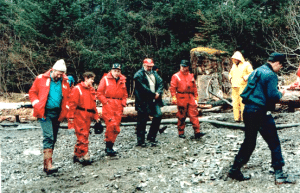 His first experience as an oil spill first responder came in March 1970 at an oil tanker spill in Nova Scotia, Canada. It was five years after this that he completed his PhD at the University of South Carolina in 1975.
His first experience as an oil spill first responder came in March 1970 at an oil tanker spill in Nova Scotia, Canada. It was five years after this that he completed his PhD at the University of South Carolina in 1975.
In 1993, he established his own company, Owens Coastal Consultants, which for the past 28 years has been providing worldwide scientific and technical support for spill response operations and spill response planning and training. Today, he is based on Bainbridge Island in the State of Washington, with a rural office from where he can look east towards nearby Seattle.
“My roles in all of this are as a response operations planner, a first responder to develop strategies to accelerate environmental recovery, and a scientist to monitor that recovery. While major spills can certainly have a disastrous on nature in the very short term, long-term studies have shown how remarkably well and quickly the environment recovers from even large oil spills.”
His most recent spill was in late November 2020 at a pipeline break in the suburban San Francisco Bay area, where he had to contend with Covid constraints and where he used dogs – ‘Oil Detection Canines’, in the industry jargon – to find the leak.
Over the years, he has been called out to destinations as far flung as Arctic Russia, the Amazon and the Middle East (he cherishes memories of seeing Dubai Creek in its pre-development days).
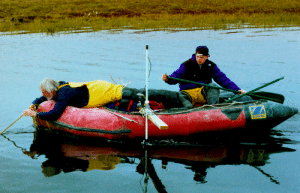 “But,” he adds, “I always seemed to managed to arrange my schedule to be on a business trip so that I could be in London during the first week in December for the Annual Brewer’s Dozen Dinner, joining a motley group of 15 friends – mainly 1962-65 First XV rugby players – which included two School Captains, multiple House Captains and even one person who did not go to QE! Such was the bond formed at the School – quite remarkable. The chain was not broken even in 2020, but then it had to be by Zoom.”
“But,” he adds, “I always seemed to managed to arrange my schedule to be on a business trip so that I could be in London during the first week in December for the Annual Brewer’s Dozen Dinner, joining a motley group of 15 friends – mainly 1962-65 First XV rugby players – which included two School Captains, multiple House Captains and even one person who did not go to QE! Such was the bond formed at the School – quite remarkable. The chain was not broken even in 2020, but then it had to be by Zoom.”
Sadly, since that last meeting, the group has been depleted by the death within a few days of each other of two of Ed’s very close friends – Richard Newton (School Captain 1963-64 and First XV and First X1 Captain; Head Boy of Harrisons’: School Governor in the 1980s) and Roderick ‘Rod’ Jones (Prefect and First XV Captain 1964-65; Head Boy of Staplyton).
As he looks back on a career that now spans more than half a century, Ed counsels patience for current pupils and recent alumni of the School: “It’s important to remember that your first job is not your last job. I went through a progression of working in government, university and then private sector consulting. My real career path really did not emerge until I was 35 years old! Which, if you put in perspective, it means that I had been working after graduation for 14 years. I’m now over 75, 40 years later.
“So, there’s no need to be in a hurry – to think that when you leave QE or leave university or college that this is going to be the single path that you’ll follow for the rest of your life. There are many twists and turns; the important thing is to understand when choices present themselves to go with your heart. If you’re never happy in your work, you’ll never be happy in your life! That’s why I’m still working at 75-plus – and all the other aspects of a balanced life – family, social activities, and so on – are reinforced by that solid foundation.”
- Pictured, top to bottom: a winter beach survey on Unalaska Island, Alaska, in April 2005; presenting a paper at the 2017 International Oil Spill Conference in Long Beach, California; in front of QE’s Main Building in July 1962; at Resolute, North West Territories, Canada, August 1967: Ed (wearing the red cap, centre), briefing Admiral Yost, the United States Coast Guard Commandant, to his right, during a shoreline inspection following the Exxon Valdez oil spill, Prince William Sound, Alaska, May 1989: Colville Delta, North Slope, Alaska August 2002.
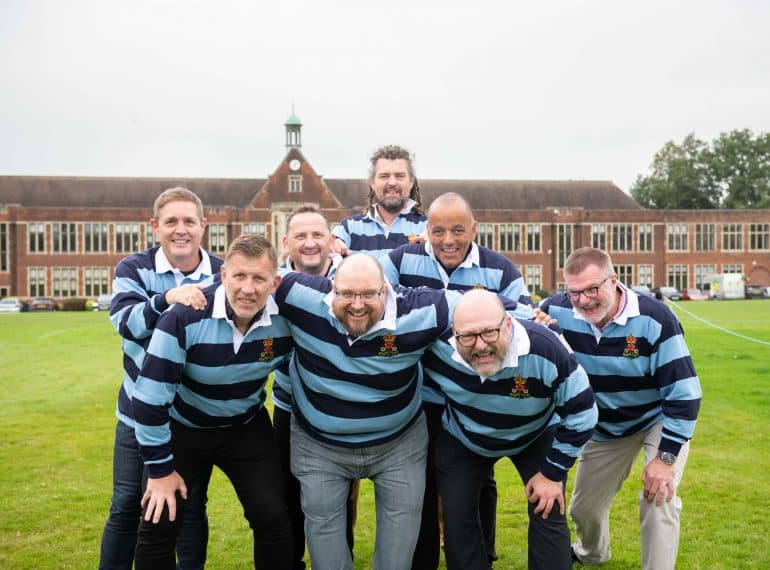
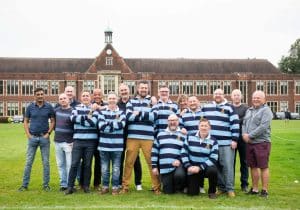 The group from the class of 1986 enjoyed a sometimes-emotional day hosted by Headmaster Neil Enright: some were meeting for the first time in more than three decades, while even those who had remained in closer contact had been kept apart for the past year-and-a-half because of Covid.
The group from the class of 1986 enjoyed a sometimes-emotional day hosted by Headmaster Neil Enright: some were meeting for the first time in more than three decades, while even those who had remained in closer contact had been kept apart for the past year-and-a-half because of Covid.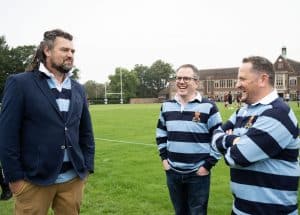 “With a group of this size, we were able to offer something quite bespoke – knowing they would enjoy the chance to see the First XV game and talk to the players afterwards. We look forward to having the group as active members of our alumni network and keen supporters of the School.”
“With a group of this size, we were able to offer something quite bespoke – knowing they would enjoy the chance to see the First XV game and talk to the players afterwards. We look forward to having the group as active members of our alumni network and keen supporters of the School.”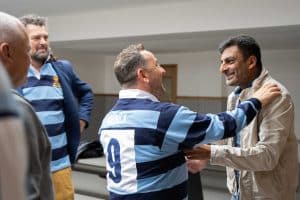 It was, in fact, a day of mixed fortunes for the School’s rugby teams: while the First XV lost their match, the Second XV won theirs. Other victories went to the U16A, U15A, U14B and U13B teams, while the U15B, U14A and U13A sides lost.
It was, in fact, a day of mixed fortunes for the School’s rugby teams: while the First XV lost their match, the Second XV won theirs. Other victories went to the U16A, U15A, U14B and U13B teams, while the U15B, U14A and U13A sides lost.
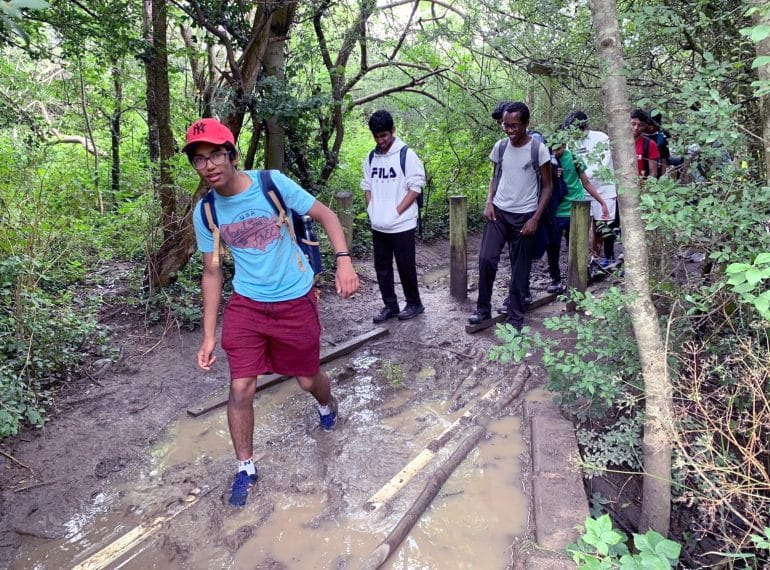
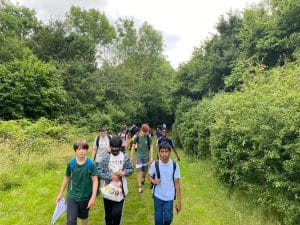 Torrential downpours forced a last-minute change of route, but the walkers were not to be denied their day in the Dollis Valley and relished the chance to stretch their legs in support of the Sathya Sai (English Medium) School in Kerala, southern India.
Torrential downpours forced a last-minute change of route, but the walkers were not to be denied their day in the Dollis Valley and relished the chance to stretch their legs in support of the Sathya Sai (English Medium) School in Kerala, southern India.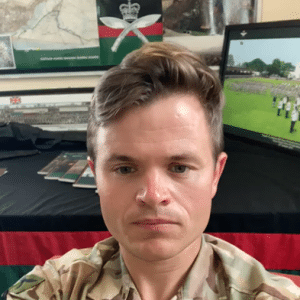 The Sai School has both boys and girls and caters for primary and secondary-age children. Over the two decades the appeal has been running, QE has funded improvements including the construction of a new building, various repairs and, recently, the provision of a computer room that enables pupils there to sit digitally-based examinations.
The Sai School has both boys and girls and caters for primary and secondary-age children. Over the two decades the appeal has been running, QE has funded improvements including the construction of a new building, various repairs and, recently, the provision of a computer room that enables pupils there to sit digitally-based examinations.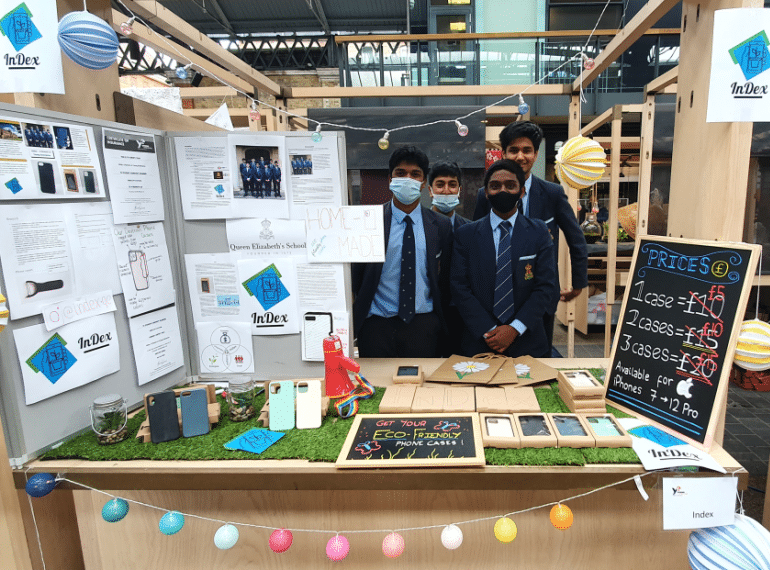
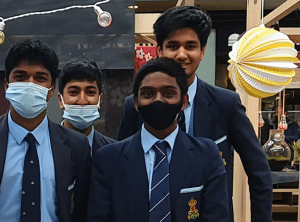 Adjudicators at the Young Enterprise Trade Fair at Old Spitalfields Market praised the InDex Young Enterprise company for their creative approach and for the salesmanship they showed there.
Adjudicators at the Young Enterprise Trade Fair at Old Spitalfields Market praised the InDex Young Enterprise company for their creative approach and for the salesmanship they showed there. “Our team impressed the judges massively,” said Mr Czirok-Carman. “They were extremely active – and very successful – in finding sales, and the judges therefore commented both on the creativity of the product and on their excellent sales techniques.
“Our team impressed the judges massively,” said Mr Czirok-Carman. “They were extremely active – and very successful – in finding sales, and the judges therefore commented both on the creativity of the product and on their excellent sales techniques.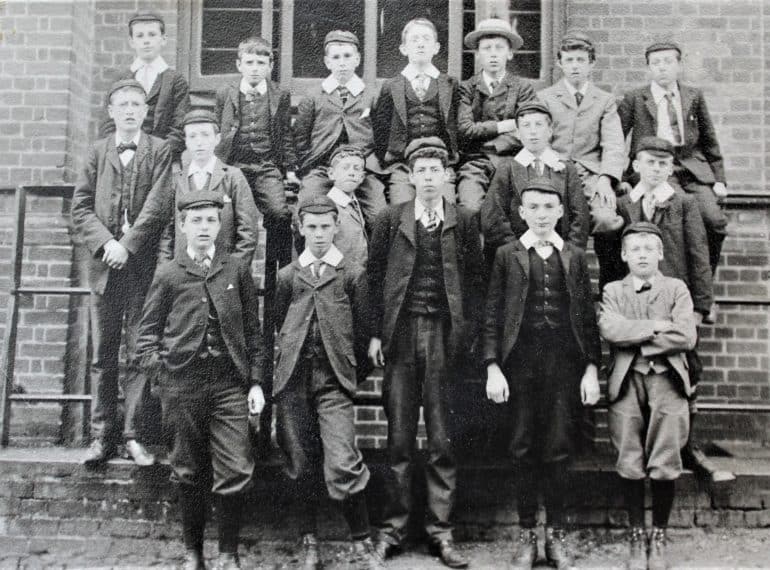
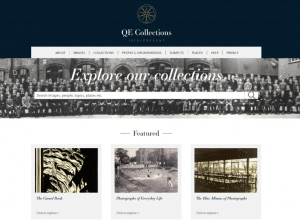 Guests at the public evening ‘town hall’ event, including Old Elizabethans and others with an interest in local history, were given a virtual guided tour and shown how to get the best out of the extensive high-quality online assets spanning more than four centuries.
Guests at the public evening ‘town hall’ event, including Old Elizabethans and others with an interest in local history, were given a virtual guided tour and shown how to get the best out of the extensive high-quality online assets spanning more than four centuries.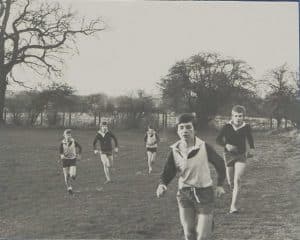 “I am very excited that we are now able to share QE Collections with a wider audience.”
“I am very excited that we are now able to share QE Collections with a wider audience.”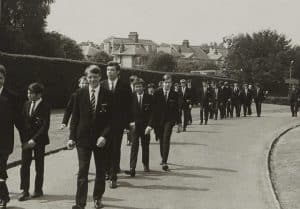 “We are constantly putting new material online, so the highlights would be different if I did this event in a few months’ time, or even next month,” Mr Bowyer added.
“We are constantly putting new material online, so the highlights would be different if I did this event in a few months’ time, or even next month,” Mr Bowyer added.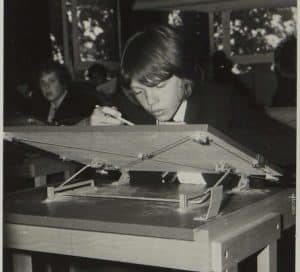 QE Collections uses professional digitisers to ensure its digitised files are of very high quality and has employed an industry-standard digital preservation system to ensure long-term availability for these digitised files, Mr Bowyer said, adding that while digital files are excellent for improving access, they are harder to preserve than physical objects, as digital storage media can become obsolete and data can become corrupted.
QE Collections uses professional digitisers to ensure its digitised files are of very high quality and has employed an industry-standard digital preservation system to ensure long-term availability for these digitised files, Mr Bowyer said, adding that while digital files are excellent for improving access, they are harder to preserve than physical objects, as digital storage media can become obsolete and data can become corrupted.
 He has worked on some of the world’s biggest and most infamous spills, such as Exxon Valdez in Alaska in 1989 and the Deepwater Horizon BP disaster in the Gulf of Mexico in 2010.
He has worked on some of the world’s biggest and most infamous spills, such as Exxon Valdez in Alaska in 1989 and the Deepwater Horizon BP disaster in the Gulf of Mexico in 2010. “Luck? Good fortune? No, not really. As many people have said I wasn’t lucky, but I worked hard – and I also would have to add that many people worked very hard on my behalf: my parents and the teachers at QE, especially my House Master, John (‘Poker’) Pearce, and subsequently a couple of mentors who shaped my professional career.
“Luck? Good fortune? No, not really. As many people have said I wasn’t lucky, but I worked hard – and I also would have to add that many people worked very hard on my behalf: my parents and the teachers at QE, especially my House Master, John (‘Poker’) Pearce, and subsequently a couple of mentors who shaped my professional career. “Most of the group at that time were Arsenal supporters because that was the nearest football ground from Barnet by British Rail. I don’t understand why, but a couple of our contemporaries actually supported Chelsea or, even worse, Tottenham! Sadly, Charlie Eggington, the Underne House Captain who followed me, is a Spurs supporter – clearly I failed in that part of mentoring him.
“Most of the group at that time were Arsenal supporters because that was the nearest football ground from Barnet by British Rail. I don’t understand why, but a couple of our contemporaries actually supported Chelsea or, even worse, Tottenham! Sadly, Charlie Eggington, the Underne House Captain who followed me, is a Spurs supporter – clearly I failed in that part of mentoring him. His first experience as an oil spill first responder came in March 1970 at an oil tanker spill in Nova Scotia, Canada. It was five years after this that he completed his PhD at the University of South Carolina in 1975.
His first experience as an oil spill first responder came in March 1970 at an oil tanker spill in Nova Scotia, Canada. It was five years after this that he completed his PhD at the University of South Carolina in 1975. “But,” he adds, “I always seemed to managed to arrange my schedule to be on a business trip so that I could be in London during the first week in December for the Annual Brewer’s Dozen Dinner, joining a motley group of 15 friends – mainly 1962-65 First XV rugby players – which included two School Captains, multiple House Captains and even one person who did not go to QE! Such was the bond formed at the School – quite remarkable. The chain was not broken even in 2020, but then it had to be by Zoom.”
“But,” he adds, “I always seemed to managed to arrange my schedule to be on a business trip so that I could be in London during the first week in December for the Annual Brewer’s Dozen Dinner, joining a motley group of 15 friends – mainly 1962-65 First XV rugby players – which included two School Captains, multiple House Captains and even one person who did not go to QE! Such was the bond formed at the School – quite remarkable. The chain was not broken even in 2020, but then it had to be by Zoom.”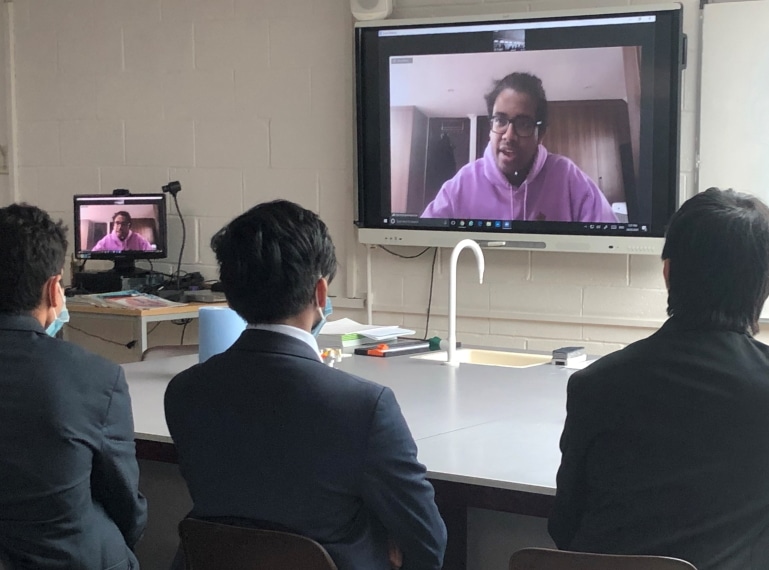
 Well over 50 Old Elizabethans – mostly those who left the School last summer – took part in the video convention for Year 12 pupils considering their university options.
Well over 50 Old Elizabethans – mostly those who left the School last summer – took part in the video convention for Year 12 pupils considering their university options.